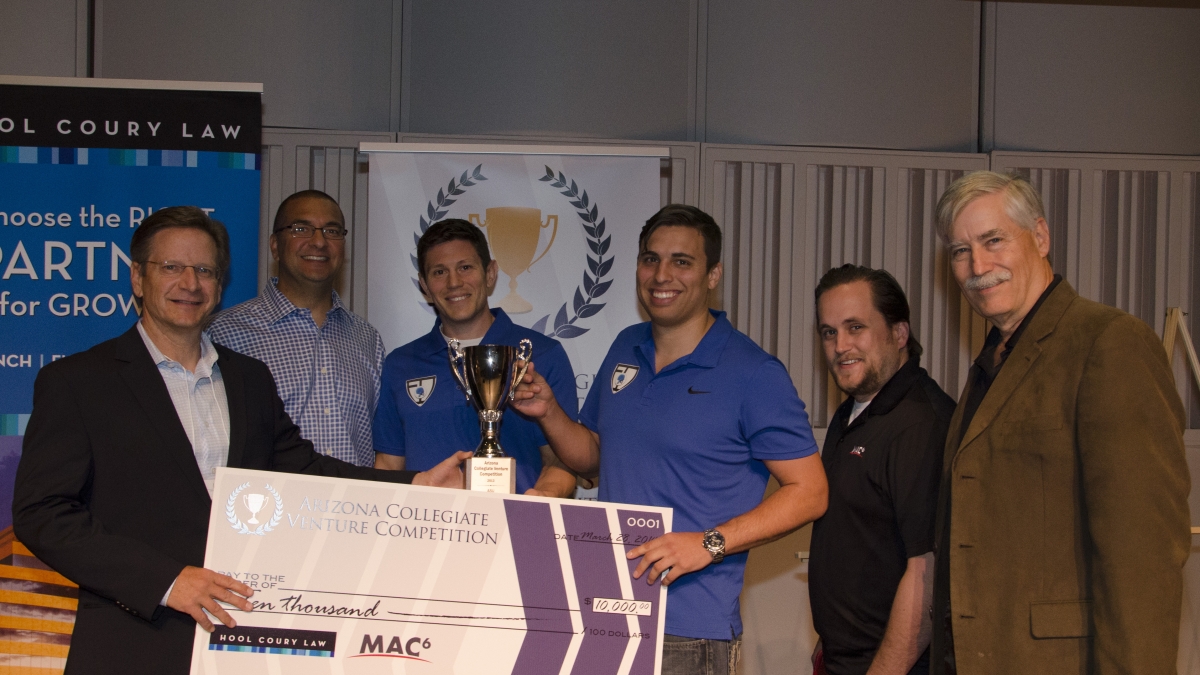ASU dominates statewide student startup competition

ASU dominated the second annual Arizona Collegiate Venture Competition last month, as four of its student startup companies placed in the competition, winning a total of $21,000 in cash prizes.
The competition, a statewide event in which select student startups from ASU, Northern Arizona University and the University of Arizona pitch their companies, was held March 28 at the University of Arizona and was sponsored by Hool Coury Law and MAC6.
Force Impact Technologies (FIT), a startup in ASU’s Great Little Companies Network, won top honors – beating out 11 other startups from ASU, NAU and UA to win a $10,000 cash prize. FIT’s victory also secured the Startup Territorial Cup – a traveling trophy that goes to the winning team’s university each year – for ASU for the second year in a row.
FIT was co-founded by Anthony Gonzales, a master's student in ASU’s W. P. Carey School of Business, and W. P. Carey alumnus Bob Merriman. The company makes FITGuard, a mouth guard for athletes that integrates force-detection technology. FITGuard measures the force of an impact, and illuminates when the force exceeds a set threshold, giving athletes, coaches and trainers a visual signal that a player has been subjected to a level of force that could cause a concussion.
“It was an honor to be selected to represent ASU,” Merriman said. “The win felt great, but more importantly, it’s always nice to get some validation that the FITGuard is a real solution to help keep kids safe while they play the sports they love.”
Amy Hillman, dean of the W. P. Carey School of Business, said, “We are creating an entrepreneurial environment at the W. P. Carey School in which students can really learn what it takes to launch and run a successful new venture. In addition to the winners of this competition, we’ve had successful student entrepreneurs recognized by the White House, Forbes magazine and Entrepreneur magazine.”
All of the ASU startups that participated in ACVC placed in the competition. In addition to FIT, ASU startups Onvard, Duo Kitchenware and SafeSIPP received prizes. Onvard, an online platform that centralizes employee training materials for employers, won $7,000. Receiving $2,000 each were Duo Kitchenware, a housewares company that makes products specially designed for people with physical disabilities, and SafeSIPP, which has developed an innovative method to transport, purify and store drinking water in developing countries.
Onvard and Duo Kitchenware are part of the Edson Student Entrepreneur Initiative, a startup accelerator that gives ASU’s student entrepreneurs the opportunity to develop their innovative ideas and launch viable startup companies. SafeSIPP, like FIT, receives support from ASU’s Great Little Companies Network.
This is the second year in a row that an ASU startup has won the top prize at the competition. Last year’s winner, Pollen-Tech, is commercializing an innovative alternative to bee pollination with the support of the Edson Student Entrepreneur Initiative.
“We’re extremely proud of all our participating startups for building on the tradition of success established by Pollen-Tech and the other ASU startups at last year’s competition,” said Gordon McConnell, associate vice president of entrepreneurship and innovation in ASU's Office of Knowledge Enterprise Development. “We’re delighted that all four of the ASU startups that competed received prize money that will help them continue to develop their companies.”
The Arizona Collegiate Venture Competition is a collaborative effort by the ASU Entrepreneurship and Innovation Group, the Northern Arizona Center for Entrepreneurship and Technology and the University of Arizona’s McGuire Center for Entrepreneurship. The event aims to showcase Arizona’s top student startups, foster collaboration among the state’s universities and highlight the outstanding entrepreneurship efforts at all three schools. Next year’s event will be hosted by Northern Arizona University.